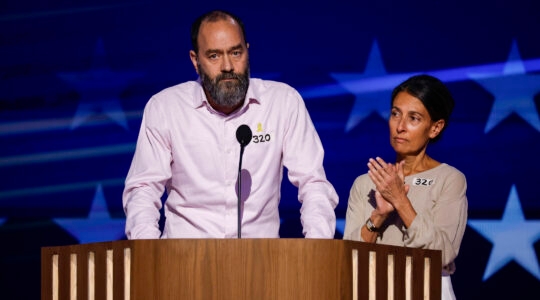WASHINGTON (JTA) — In the face of growing congressional concern over Middle Eastern extremism, some key Jewish Democrats are working to make sure President Obama has the leeway to dole out aid to Arab entities.
The issue came to a head last week in the form of a State Department funding bill that makes clear the unhappiness of Congress.
Through sharp exchanges and in subtle changes, Jewish members on the U.S. House of Representatives’ Foreign Affairs Committee attempted to advance the bill while leaving Obama room to engage with unfriendly regimes. The committee, chaired by Rep. Ileana Ros-Lehtinen (R-Fla.), referred the bill to the full House last Friday following a grueling session that lasted most of two days and often erupted with tensions.
The battle featured several Jewish Democrats arguing that despite growing congressional concern over Middle Eastern extremism — including Palestinian incitement to violence against Israel — it was vital to maintain the president’s flexibility in doling out foreign aid.
Rep. Gary Ackerman (D-N.Y.), the senior Democrat on the committee’s Middle East subcommittee, said severe limitations on the president’s ability to control foreign policy undercut U.S. security. “There’s always unforeseen consequences,” Ackerman said, “and the president must have the authority to make a determination in accordance with national security concerns."
But others, including Republicans such as Ros-Lehtinen, warned that the danger of U.S. funds reaching terrorists can be contained only through tough congressional oversight, which was stipulated in the State Department funding bill.
"We must require specific certifications from the administration prior to the distribution of any further security assistance to Pakistan, Lebanon, the Palestinian Authority, Egypt and Yemen to ensure that such assistance is halted if it jeopardizes U.S. security interests or is benefiting or being manipulated by extremist groups,” Ros-Lehtinen said in her introductory remarks to the committee debate on the bill.
In recent decades, the Democratic faction on the committee has had a disproportionate number of Jewish lawmakers, and its two previous chairmen, Rep. Howard Berman (D-Calif.) and the late Rep. Tom Lantos (D-Calif.), have been Jewish. (Ros-Lehtinen is of Jewish descent.) Currently, seven of the committee’s 20 Democrats are Jewish.
Many of the battles over the bill were over the conditions under which the president would be allowed to waive bans on funding assistance to the Arab world.
Berman, the senior Democrat on the committee, said that cutting off nations and entities deemed hostile by the Republican majority in the House ultimately would undercut democracy promotion — a cause, which he noted, that the Republicans champion, too.
"If we did actually do what some of the amendments required, causes that are very dear to a lot of people who supported the amendment would be very upset,” Berman said.
Berman cited his proposed amendment to language in the authorization bill that would require certification from the U.S. president that Lebanon’s government was dismantling terrorist groups as a condition for waiving a ban on aid. That made sense, he said, with the current government, which is backed by Hezbollah. But should the pro-Western, so-called March 14 coalition return to power, it would hamper a friendly government that would be unable to disarm Hezbollah, at least at first.
“Why would we want to limit assistance to a friend?” Berman said. His amendment failed to pass the committee.
Rep. Eliot Engel (D-N.Y.) succeeded in passing an amendment that altered similar language that would have placed stricter restrictions on assistance to the Palestinian Authority.
Ros-Lehtinen’s original language would have allowed the president to waive a ban on funding of the Palestinian Authority only if the president was able to certify that "the Palestinian Authority has halted all anti-Israel incitement in Palestinian Authority-controlled electronic and print media and in schools, mosques, and other institutions it controls, and is replacing these materials, including textbooks, with materials that promote tolerance, peace, and coexistence with Israel.”
Engel’s amendment, which Ros-Lehtinen approved, significantly softened that language to “is not engaging in a pattern of incitement against Israel” — a considerably lower bar for the White House.
Engel noted that his amendment still called out the Palestinians for incitement, and that a separate amendment he proposed — and that the committee passed — would ban assistance to the Palestinian Authority should it pursue recognition of statehood at the United Nations in the absence of negotiations with Israel.
In an interview with JTA, Engel said he wanted to counter Republican charges that Democrats were cooling on Israel.
“I wanted to send a very strong message that support for Israel is bipartisan and strong,” the veteran New York lawmaker said.
Rep. Ted Deutch (D-Fla.) said singling out Israel for continued assistance while cutting aid elsewhere, as some Republicans have proposed, is counterproductive.
“If we go down a path that says Israel deserves foreign aid but other countries do not, we’re going to make it easier to undercut support for the U.S.-Israel relationship,” Deutch told JTA.
Deutch, who proposed successful amendments recommending additional resources to track Iran sanctions busters and stipulating that the release of captive Israeli soldier Gilad Shalit be a principle of renewed peace talks, delivered one of the most impassioned speeches of the marathon debate late on the night of July 21. He spoke out against an amendment proposed by Rep. Jeff Duncan (R-S.C.) that would have cut funding to those nations that fail to support the United States at the United Nations.
“It is high time that we disabuse ourselves of this notion that what we’re talking about is the cutting of checks to governments that we don’t agree with,” Deutch said, noting that foreign aid constitutes much less than 1 percent of the U.S. budget. “The money we spend on foreign aid isn’t a gift; it is in our self interest to promote freedom, and to promote security and to promote prosperity.”
But Duncan said it’s galling to fund countries that make a habit of attacking the United States at the United Nations and other forums.
"We’re $14.3 trillion in debt," he said at the committee hearing. "Why should we pay countries to hate us when they’ve shown they’re willing to do it for free?”
Rep. Renee Ellmers (R-N.C.) chided Deutch for not mentioning who was paying for the assistance.
"Where does the money come from, sir, where does the money come from?" Ellmers asked. "Not one time have you mentioned in all of your high ideals that you’ve outlined: taxpayer dollars."
Ackerman grew so frustrated with the process that he offered an amendment that would have cut aid entirely, causing an outcry among Republicans.
“It makes no sense at all,” he said, referring to the proposal to cut funding to nations who do not back the United States at the United Nations. “Over 130 countries don’t vote with us,” including countries like Pakistan, where the U.S. keeps troops. “How do you cut off countries where we have bases?”
JTA has documented Jewish history in real-time for over a century. Keep our journalism strong by joining us in supporting independent, award-winning reporting.





